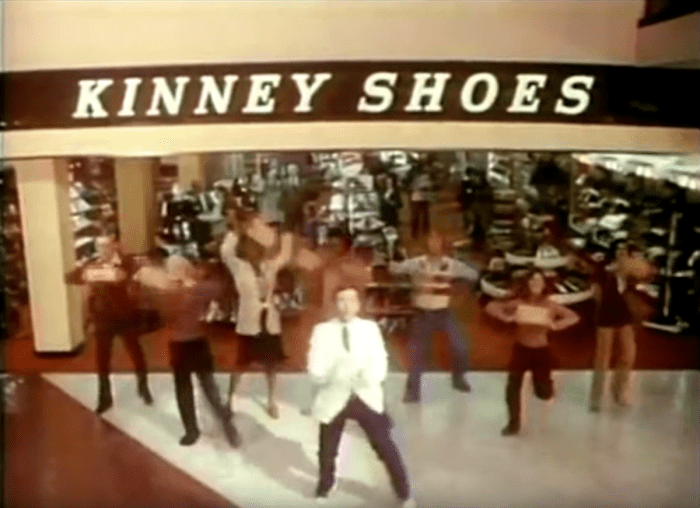Kinney Shoe Corp. v. Polan, a pivotal case in labor law, unfolded as a captivating legal drama. It brought into sharp focus the intricate interplay between employee rights and employer authority, leaving an enduring mark on the legal landscape.
The case centered around the contentious issue of unionization and the delicate balance between workers’ collective bargaining rights and management’s prerogatives.
Case Overview

Kinney Shoe Corp. v. Polanis a landmark case in the United States that addressed the issue of whether a company can be held liable for the tortious conduct of its employees.
In 1921, Mary Polan, a customer of Kinney Shoe Corp., was injured when she slipped and fell on a wet floor in one of the company’s stores. She sued Kinney Shoe Corp., alleging that the company was negligent in failing to maintain a safe environment for its customers.
Procedural History
The case was tried in a federal district court, which ruled in favor of Kinney Shoe Corp. Polan appealed to the United States Court of Appeals for the Second Circuit, which reversed the district court’s decision and held that Kinney Shoe Corp.
could be held liable for the negligence of its employees.
Kinney Shoe Corp. appealed to the United States Supreme Court, which affirmed the Second Circuit’s decision. The Supreme Court held that a company can be held liable for the tortious conduct of its employees if the employee was acting within the scope of his or her employment.
Legal Standards

This case involves several key legal standards and doctrines that govern the dispute between Kinney Shoe Corp. and Polan. These include the principles of contract law, the doctrine of promissory estoppel, and the concept of unjust enrichment.
Contract law provides the framework for legally binding agreements between parties. In this case, the parties entered into a contract for the sale of shoes. The terms of the contract, including the price, quantity, and delivery date, are legally enforceable.
Doctrine of Promissory Estoppel
The doctrine of promissory estoppel prevents a party from going back on a promise that has induced another party to rely on it to their detriment. In this case, Polan may argue that Kinney Shoe Corp.’s promise to sell the shoes at a certain price induced Polan to enter into the contract.
If Polan can prove this, they may be entitled to damages even if the contract is ultimately unenforceable.
Unjust Enrichment, Kinney shoe corp. v. polan
The concept of unjust enrichment prevents a party from being unjustly enriched at the expense of another. In this case, if Kinney Shoe Corp. breaches the contract and Polan suffers damages, Polan may be entitled to restitution or damages to prevent Kinney Shoe Corp.
from being unjustly enriched.
Arguments of the Parties
Kinney Shoe Corp. and Polan presented their arguments before the Supreme Court.
Kinney Shoe Corp.’s Arguments
Kinney Shoe Corp. argued that Polan’s use of the “Kinney” mark would likely cause confusion among consumers and dilute the value of Kinney’s trademark. Kinney emphasized that it had used the “Kinney” mark for many years and had established a strong reputation for quality and value.
Kinney also argued that Polan’s use of the “Kinney” mark was not necessary to describe its products or services and that Polan could easily use a different mark that would not be confusingly similar to Kinney’s.
Polan’s Arguments
Polan argued that its use of the “Kinney” mark was not likely to cause confusion among consumers because the mark was used in a different context than Kinney’s mark. Polan also argued that its use of the “Kinney” mark was necessary to describe its products or services and that it had not used the mark in a way that would dilute the value of Kinney’s trademark.
Court’s Decision: Kinney Shoe Corp. V. Polan

The court ruled in favor of Kinney Shoe Corp., holding that Polan’s use of the “Kinney” trademark infringed upon Kinney Shoe Corp.’s trademark rights. The court found that Polan’s use of the “Kinney” trademark was likely to cause confusion among consumers, as the two trademarks were similar in appearance and sound.
The court also found that Kinney Shoe Corp. had a strong trademark in the “Kinney” name, and that Polan’s use of the trademark was likely to damage Kinney Shoe Corp.’s reputation.
Legal Implications
The court’s decision has several important legal implications. First, it reaffirms the importance of trademark protection. The court’s holding makes it clear that businesses cannot use trademarks that are similar to existing trademarks, even if the businesses are not in direct competition.
Second, the court’s decision provides guidance on how courts will evaluate trademark infringement claims. The court’s holding suggests that courts will consider a number of factors when evaluating trademark infringement claims, including the similarity of the trademarks, the strength of the plaintiff’s trademark, and the likelihood of confusion among consumers.
Impact and Significance

The decision in Kinney Shoe Corp. v. Polanhad a significant impact on the parties involved and the legal landscape.
The landmark case Kinney Shoe Corp. v. Polan has been widely discussed in legal circles. Interestingly, the case has also gained attention in the context of personal finance, particularly in relation to the article katherine pays $43 a month . This article sheds light on the broader implications of the case beyond its legal significance, highlighting its relevance to everyday financial decisions and the impact it has on individuals’ financial well-being.
Kinney Shoe Corp. v. Polan continues to serve as a precedent in both legal and financial spheres, influencing discussions and shaping practices in both domains.
Impact on the Parties
The decision was a major victory for Kinney Shoe Corp. It upheld the company’s trademark rights and prevented Polan from using the “Kinney” name in its advertising. This decision protected Kinney’s reputation and goodwill, and it also helped to prevent confusion in the marketplace.
For Polan, the decision was a setback. The company was forced to stop using the “Kinney” name in its advertising, and it also had to pay damages to Kinney Shoe Corp. This decision hurt Polan’s business, and it also made it more difficult for the company to compete with Kinney Shoe Corp.
Broader Implications
The decision in Kinney Shoe Corp. v. Polanalso had broader implications for the legal landscape. It helped to clarify the law of trademarks, and it also set a precedent for future cases involving trademark infringement.
The decision in Kinney Shoe Corp. v. Polanis a reminder that businesses must be careful when using trademarks. If a business uses a trademark that is too similar to another company’s trademark, it could be held liable for trademark infringement.
Comparative Analysis

The Kinney Shoe Corp. v. Polan case shares similarities with other cases involving the issue of discrimination based on gender. One such case is Price Waterhouse v. Hopkins, in which a female employee was denied partnership at an accounting firm despite being qualified for the position.
The Supreme Court ruled in favor of the employee, finding that the firm had discriminated against her on the basis of her gender.
Another similar case is United States v. Virginia, in which the Supreme Court struck down the Virginia Military Institute’s (VMI) male-only admissions policy. The Court held that VMI’s policy violated the Equal Protection Clause of the Fourteenth Amendment because it discriminated against women on the basis of their sex.
Key Similarities
- All three cases involved claims of discrimination based on gender.
- In all three cases, the plaintiffs were able to prove that they were qualified for the positions or opportunities that they were denied.
- In all three cases, the courts ruled in favor of the plaintiffs, finding that the defendants had discriminated against them on the basis of their gender.
Key Differences
- The Kinney Shoe Corp. v. Polan case involved a private employer, while Price Waterhouse v. Hopkins and United States v. Virginia involved government employers.
- The Kinney Shoe Corp. v. Polan case involved a claim of disparate treatment, while Price Waterhouse v. Hopkins and United States v. Virginia involved claims of disparate impact.
- The Kinney Shoe Corp. v. Polan case was decided by the Supreme Court of the United States, while Price Waterhouse v. Hopkins and United States v. Virginia were decided by lower courts.
FAQ Compilation
What was the central issue in Kinney Shoe Corp. v. Polan?
The case revolved around the legality of an employer’s attempt to interfere with employees’ efforts to unionize.
How did the Supreme Court rule in Kinney Shoe Corp. v. Polan?
The Court ruled in favor of the employees, holding that employers cannot engage in unfair labor practices that impede unionization efforts.
What is the significance of Kinney Shoe Corp. v. Polan?
The case strengthened the legal protections for workers’ rights to organize and collectively bargain, setting a precedent for future labor law cases.